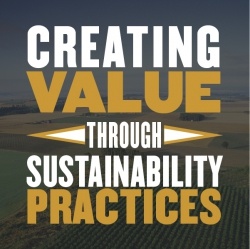 Article
Article
Lloret, A. “Modeling corporate sustainability strategy.” Journal of Business Research 69 (2016): 418-425.
Reviewer
Dr. R. Brent Ross, PhD
Summary
This study develops an analytical model of corporate sustainability to demonstrate that firms can achieve long-term superior performance by embedding three views of sustainability into their strategic plans: market-industry (source of competitive advantage), resource-based (source of new capabilities and resources) and institutional-based (capacity to adapt). The central thesis is that firms can generate and capture value by adapting to the restrictions and limitations imposed on them by economic, social and environmental systems. An analysis of the model is demonstrated using both empirical data from a survey of the environmental sustainability practices of 103 self-selected large Mexican firms, as well as an in-depth review of the sustainability practices of five leading Mexican firms.
What this means for agribusinesses
Many food and agribusiness managers will already be familiar with the notion that adopting sustainable practices can create value (across economic, environmental, and social dimensions) and lead to superior long-term firm performance. Although it has taken different forms, including corporate social responsibility (CSR), triple bottom line, the three Ps (people, planet, and profits), this concept has been around for more than 15 years. What might be new, however, is that the rate at which these practices are being adopted by firms seems to have increased dramatically in recent years. In fact, one study found that more than 80 percent of large food and agribusiness firms reported that they had adopted some type of corporate sustainability program.
Why has corporate sustainability become a central activity for many food and agribusiness firms? The answer to that question is probably as fragmented as today’s food and agribusiness markets. In fact, it is probably not a coincidence that as markets have become more fragmented (and competitive) that firms have looked to corporate sustainability strategies as a potential source of new-value creation. Such practices allow firms to capture the value (through premiums) of differentiating their offerings with a wide range of economic, environmental and social benefits that may be bundled in unique ways. Most common, these offerings include some combination of organic, local, bio-based, environmentally friendly, fair trade, or other sustainability-related attributes. In other cases, firms have attempted to capture value through cost savings by introducing more efficient technologies and production practices. As described in the article, such initiatives can form the basis for a firm’s competitive strategy.
However, consistent with both the findings presented in this article and my own research elsewhere, food and agribusiness firms have been more likely to adopt corporate sustainability practices as a response to the limitations and/or expectations imposed by on them by the environment or other stakeholder groups. Among the most popular sustainability initiatives seem to be production practices that cut waste or energy usage, or the adoption (and documentation) of production practices to meet the standards set by downstream supply chain partners, consumers, NGOs or government institutions. In this form, sustainability initiatives can create value by reducing risk and/or protecting the firm’s “license to operate” in the market.
To be clear, developing and implementing a corporate sustainability strategy is an expensive and non-trivial process. However, the challenge for food and agribusiness managers is not necessarily whether to invest in a corporate sustainability strategy, but how. The costs of neglecting a firm’s corporate sustainability strategy are high and might include lost market share, limited access to markets, lawsuits and other significant penalties. To complicate matters, the academic literature provides little direction to managers on how to invest in this area. In fact, it is full of studies that find that the financial returns to corporate sustainability strategies are mixed at best.
For food and agribusiness managers, some of the important questions that must be addressed with respect to the firm’s corporate sustainability strategy are:
• How much do we invest in this area?
• Should we invest equally across economic, environmental and social initiatives?
• How do we measure sustainability outcomes?
• How do we communicate our progress to stakeholders?
• How do we manage the diverse (and sometimes competing) needs (or standards) of different stakeholders?
Finding answers to these questions will require careful analysis, experimentation and innovation, and in some cases, participation in multi-stakeholder initiatives where managers can learn and manage sustainability issues together in a pre-competitive space.




